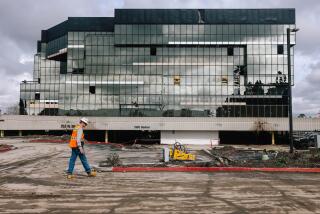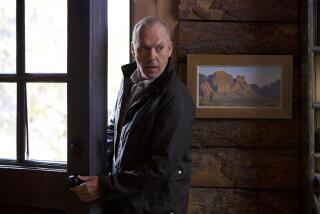Layoffs would bring new life to ‘The Office’
“The Office” is sagging and it is a conundrum to which there is only one real solution: fire Michael Scott. Or Steve Carell. Whatever it takes.
Early on, taking after Ricky Gervais’ David Brent on the original British version of the show, Michael was a catalyst for misbehavior and ill will. He was difficult, verging on unlovable; you almost had to shield your eyes watching him, so great was his capacity for awkwardness.
But as the American version has aged, evolving beyond the structure of its predecessor, the expectation that Michael will occupy the same amount of space as he did during the show’s earlier seasons, when his gaffes were more gratuitous, has become burdensome.
And exhausted too. Carell can’t quite play him as the simp he once was: His shoulders are slightly squarer, his hair slightly better, his uncertainty a little more certain. It’s as if the show no longer believes in the character’s wacky potential.
Instead, in order to breathe new life into Michael, he has become something that was virtually impossible in earlier seasons, given the naive arrogance that motivated his behavior: sympathetic. Many of the show’s recent episodes have been dragged down by Michael’s depression in the wake of his split with Holly Flax (Amy Ryan).
Formerly incapable of seriousness, he’s become something of a sad sack, ill-equipped to grapple with his pain. Of course, no one around him is much inclined to help. Scorn is central to most of the relationships that the show’s other characters have with Michael, and little has happened to change that. He’s still incompetent, foolish and blinded by his inanity, but now he’s needy too, an emotion that has no place here.
His impromptu lonely-hearts party a couple of weeks ago just felt tragic; he never once subverted his own sadness, the trait of his that has long made his character distinctive, if grating. Typically, the show has been able to rely on Jim ( John Krasinski) and Dwight (Rainn Wilson) when Michael became unbearable, but both of those characters have also eroded of late.
Jim has become smug and self-satisfied -- not even his engagement to Pam (Jenna Fischer) redeems him. Where his fourth-wall-breaking looks into the camera were once befuddled, now they’re withering, making him less a hapless bystander and more a conspirator. And as Dwight, Wilson has injected a confidence that has made the character less shocking.
Now, when he delivers his absurd pronunciations on his own potency, his eyebrows are raised just a bit, awaiting a response that his deadpan-ness used to trigger automatically. To judge by the last couple of months, all three primary characters could go on an extended work retreat and do little damage to the show -- many of its recent high points have happened at the margins.
Dealing with a weak heart, Stanley (Leslie David Baker) has been more vibrant than ever. “I don’t have enough saved to retire,” he recently lamented. “I feel like I’m working in my own casket.”
The sexual radiance of Angela (Angela Kinsey) upon acquiring a new cat was brilliantly discomfiting, and the scene in which Oscar (Oscar Nuñez) and Kevin (Brian Baumgartner) watched her, via webcam, as she cleaned her new prize pet with her tongue was one of the most inventive and shocking scenes on any sitcom in recent memory.
And the show’s most constant love, between Phyllis (Phyllis Smith) and Bob Vance (Robert R. Shafer), continues to provide small pleasures, such as when they abandoned Jim and Pam at lunch to have sex in a restaurant bathroom. Jim and Pam were shocked, but they should have been taking notes.
Not all subplots have been successful. The episode-long debate about Hilary Swank’s hotness, and the gruesome film-within-the-show involving a love triangle among Jessica Alba, Jack Black and Cloris Leachman, both felt like stretched-out one-liners from “Family Guy.”
Occasionally, though, especially when all the characters get together in one room, the original sparks reemerge. Last month, Michael struggled his way through a particularly vicious roast by his co-workers, but even as it got more and more cruel, it was hard to feel for him.
But at the end of the episode, when he gave them their comeuppance, it was unexpectedly gratifying, the rare moment where a Michael Scott victory was also just, plainly speaking, a victory.
More to Read
The complete guide to home viewing
Get Screen Gab for everything about the TV shows and streaming movies everyone’s talking about.
You may occasionally receive promotional content from the Los Angeles Times.






